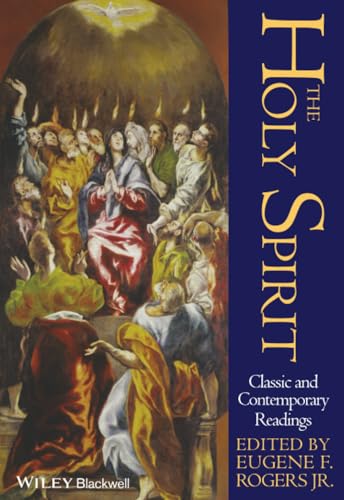The Holy Spirit: Classic and Contemporary Readings
Written by Eugene F. Rogers Jr., ed. Reviewed By Stephen JenksEugene Rogers, editor of The Holy Spirit: Classic and Contemporary Readings, conceives of this collection as a companion to his constructive work on the Holy Spirit, After the Spirit: A Constructive Pneumatology from Resources Outside the Modern West, and indeed, the latter title hints at the nature of the selections collected in the former. Comprised of thirty-two readings, the collection is bookended with contemporary readings in two sections called “Late Twentieth-Century Questions” and “Late Twentieth-Century Applications.” Between these two one encounters readings organized as “Syriac Sources,” “Early Greek Resources,” “Latin Resources,” “German Resources,” “Russian and Romanian Resources,” and “Mystical Resources.”
“Diverse” is probably the best word to describe this collection. This diversity can be charted on various axes. In it one encounters familiar names such as Athanasius, Augustine, Luther, and von Balthasar as well as more obscure authors such as Guerric of Igny, Pavel Florensky, and John Ruusbroec. The collection also covers the broad sweep of Christian history by including readings from as early as the fourth century in selections by Cyril of Jerusalem and Ephrem the Syrian to as late as 2000 in works by Rowan Williams and Bruce Marshall with stops in the Middle Ages and the Reformation along the way. While some of the Greek, Latin, and German sources may be familiar to many readers, the Syriac, Russian and Romanian, and Mystical resources will likely be unfamiliar to all but the most widely read. Additionally, there is a diversity of genre and length with essays, sermons, hymns, denominational documents, and even pictures represented.
For the most part, this diversity is a strength for this collection. It serves the readers by exposing them to traditions, eras, modes of theological reflection, and approaches to biblical interpretation that they are not likely to encounter elsewhere. This is perhaps more valuable than any specific ideas about the Spirit that one may glean from the reading. While this would be a strength of any such collection, it is particularly valuable for a collection on the Holy Spirit. Polarization in discussions of the Spirit in the contemporary theological milieu has often silenced dialogue to the mutual detriment of the dialogue partners or allowed specific issues to dominate the conversation.
Two traditions in particular that are likely to be new to most readers are the Syriac and the Orthodox traditions. Given his prefatory comments for these works, Rogers clearly believes these that resources helpfully correct some of the imbalances that he perceives in Western pneumatological thought. What this means practically is that the average reader is not likely to find much in these selections that resonates with their current understanding of the Spirit. Each reader must decide whether that is good or bad.
Perhaps the greatest strength of this book is Rogers’s introduction to each selection. He deftly orients the selections within broader historical and theological frameworks, and he frequently situates the theologians in their historical context or within particular theological movements. This is especially helpful with those lesser known authors (at least to this reviewer). One may learn as much from the introductions as from the readings.
Obviously no collection can be truly comprehensive, so there are themes that one might have expected to encounter here that are minor or absent. While the issue of the gender of the Spirit is mentioned in passing in a few places, none of the selections address this topic directly, nor does the collection more broadly offer much direction in considering that question. A Scripture index attests to the importance of Scripture for the readings, yet no particular reading is an extended reflection on any “classic” Spirit passage. A selection from a commentary would have been a solid addition.
In a few of the readings it is difficult to “find” the Spirit or to understand precisely the rationale for the selection’s inclusion. In others, perhaps most notably the selections by Hans Urs von Balthasar and Jürgen Moltmann, the excision of the passage from its context (“Mysterium Paschale” and “The Trinity and the Kingdom,” respectively) weakens the impact of the ideas by divorcing them from the larger flow of thought in their context. These selections maybe disorienting to some readers.
The organization of the material is curious as well. Unlike some of the historical texts, the contemporary articles presuppose an awareness of some of the deeper questions in Pneumatology today. That the collection starts with such challenging texts could be off-putting to the more casual reader. Many of the selections are challenging reads because of the theological depth, writing style, or just the mode of theological discourse. Many are not for the theologically faint of heart.
The work is diverse enough that there is likely something for everyone to like but also equally likely that there is something to dislike. Many theologically conservative readers may find the mystical writings in particular to be less than compelling. Unfortunately, the content of many of the readings presupposes a level of familiarity with narrow issues within Pneumatology, which reduces the usefulness of this collection to the scholar or the seminary classroom. While the book could certainly work as a supplemental text in a graduate-level class on the Spirit, its intentional design as a collection of texts outside of the “western canon” limits its usefulness as a primary text.
Stephen Jenks
Stephen Jenks
Union Christian Church
Tegucigalpa, Honduras
Other Articles in this Issue
I didn’t come from an Evangelical home, and though he never told me outright, I’m sure my father never wanted me to become a pastor...
Does Baptism Replace Circumcision? An Examination of the Relationship between Circumcision and Baptism in Colossians 2:11–12
by Martin SalterReformed paedobaptists frequently cite Col 2:11–12 as evidence that baptism replaces circumcision as the covenant sign signifying the same realities...
New Commentaries on Colossians: Survey of Approaches, Analysis of Trends, and the State of Research
by Nijay GuptaNew Testament scholarship in its present state is experiencing a time of abundance, especially with respect to biblical commentaries of every shape, length, level of depth, theological persuasion, intended audience, and hermeneutical angle...
It might seem odd to write an editorial for a theological journal on the topic of not doing theology and how important that can be; and, indeed, perhaps it is contrarian even by my own exacting standards...
Most readers of Themelios will be aware that the word “perfectionism” is commonly attached in theological circles to one subset of the Wesleyan tradition...







